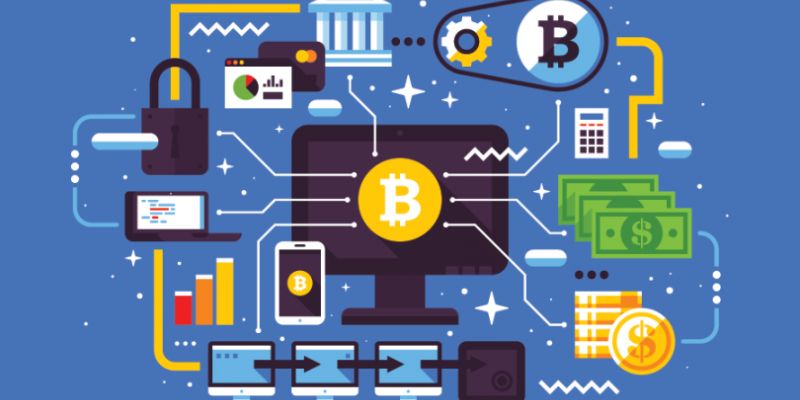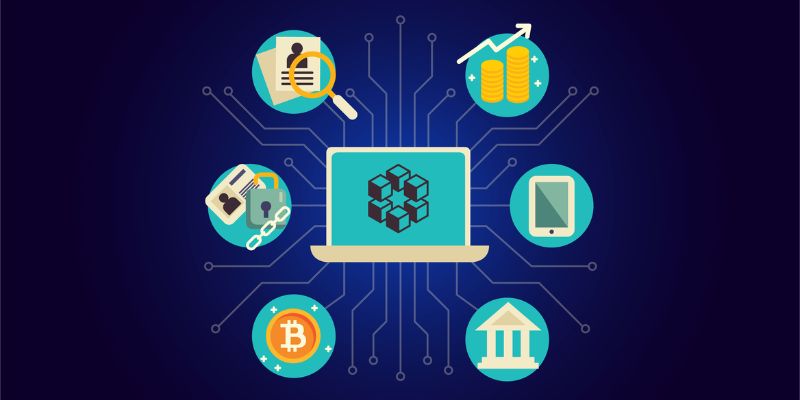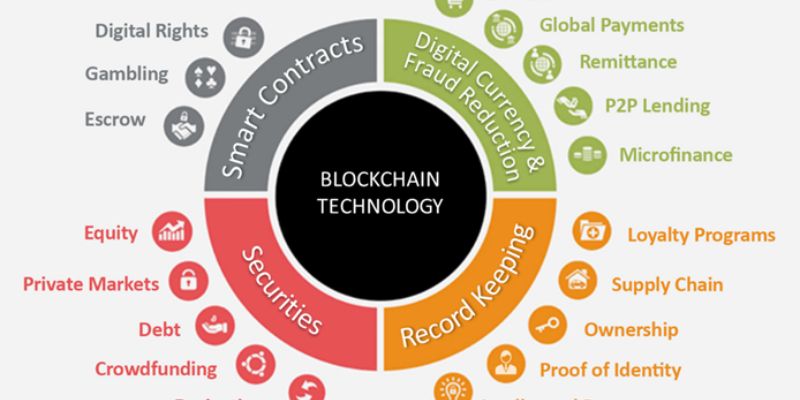Imagine a world where every transaction, every record, is secure, fast, and transparent. That’s the promise of blockchain, and it’s not just a dream. It’s happening now, and it’s changing how we interact with the digital universe. Let’s dive into the applications of blockchain that are revamping our world. From the way we manage our money to securing sensitive data — it’s all being transformed. You’ll see how our financial transactions evolve, how healthcare and creative industries protect their data, and how supply chains get smarter. Even beyond business, blockchain opens new ways to own and trade digital assets and strengthen trust in public systems. Stick with me, and explore how these blockchain applications are not just revolutionary but are already unlocking the future before our eyes.
The Evolution of Financial Transactions with Blockchain
The Rise of Cryptocurrency and Blockchain Integration
Blockchain technology uses are exploding, especially in finance. Cryptocurrency advancements let people send money across borders faster and safer than ever. It’s like giving cash directly to someone far away, but through the internet. These transactions skip the usual steps, so they happen almost right away. This all thanks to blockchain’s smart way of tracking who owns what, without needing a bank to check everything.
Enhancing Security and Speed in Cross-Border Payments
Speaking of sending money, cross-border payments are now a breeze. In the old days, you’d wait days or pay big fees, but blockchain has changed the game. Every step is clear and can’t be hacked easily. Money moves like a text message – quick and simple.
Implementing Smart Contracts for Automated Financial Operations
Now, let’s talk about smart contracts implementation. It’s like having a robot lawyer that does deals for you. It checks if everyone does what they agreed to, then completes the deal, all by itself. This means fewer mistakes, no waiting for people to decide, and it’s all recorded on the blockchain’s digital ledger systems.
Smart contracts can do things like share profits with artists every time their song gets played or even manage a whole supply chain automatically. They could even help you buy a house without the mountain of paperwork. It’s safe because once it’s set up, nobody can mess with it.
All these changes mean dealing with money is faster, cheaper, and safer than old ways. Whether it’s protecting healthcare data, using blockchain in the energy sector, or just buying something online, blockchain is everywhere.
In the future, we could even vote from our phones with blockchain to make sure every vote counts and is secure. We can also use blockchain to prove that something is real, like expensive watches or sneakers, so no more fakes.
And for those who dream of being an inventor, blockchain can protect your new ideas so that only you can decide who uses them. With blockchain, we’re not just talking about money – we’re talking about fair play, safety, and trust in ways we never did before.
Enhancing Data Security in Sensitive Industries
Blockchain’s Role in Healthcare Data Protection
Healthcare data security is critical. Blockchain can help. This tech keeps health records safe and private.
Ensuring Patient Privacy Compliance with Emerging Blockchain Solutions
Medical info is very private. Hospitals must protect it. Blockchain stores data across many places. This makes it hard for hackers to steal. This tech follows privacy laws well. Hospitals are starting to use blockchain more for this reason.
Leveraging Blockchain for Combatting Counterfeit Pharmaceuticals
Fake drugs are dangerous. They can harm people and cost money. Blockchain tracks drugs from the maker to the buyer. With blockchain, each step of the drug’s trip is recorded. This way, you can trust your medicine is real.
Intellectual Property and Royalty Distribution in Creative Sectors
Creators like artists and musicians own their work. They can make money from it. Blockchain helps manage this.
Tokenization of Intellectual Property Assets
Creators can turn their work into digital tokens. This is called tokenization. It shows who owns something online. It’s like a digital signature. If you have the token, you own part of the work.
Transparent and Efficient Royalty Distribution Platforms
When people enjoy music or art, the creator earns money. This is a royalty. Blockchain makes paying royalties simple and clear. It writes down who should get what. This way, artists get paid fairly and fast.
Blockchain technology is reshaping industries. It brings more security to our private info. It stops fake products. It helps creators control their work and get paid. With blockchain, we’re building a safer, fairer world.
Reinventing Supply Chain Management
Achieving End-to-End Visibility and Optimization
Supply chains can be messy. Goods pass through many hands before reaching you. Yet, blockchain technology uses can make it all clear and simple. Imagine a world where you can see where everything on your table comes from. That’s supply chain optimization, and it’s now possible.
Blockchain for Real-Time Auditing and Supply Chain Transparency
With blockchain, every step in the supply chain is recorded. This means no more guessing about where your food or clothes came from. It’s all there in the digital ledger systems. You can check it anytime. This is real-time auditing at its best.
Traceability in Logistics and Food Safety Enhancements
How do we make sure food is safe to eat? Blockchain again! It tracks food from the farm to your plate. If there’s a problem, we find it fast. This means better food safety enhancements. And it’s great for the companies too. They save time and money.
The Impact of Blockchain on Retail and Agriculture
Blockchain in retail changes everything. It helps fight fake products. You know you’re buying the real deal. And blockchain for legal contracts means all trades are fair. In agriculture, knowing your product’s journey is crucial. This tech makes it easy to track. Plus, it helps farmers get their fair share.
Innovations in Combating Counterfeit Goods
Fake goods can look real. But blockchain spots the fakes. It ensures that luxury goods authentication is top-notch. No more tricks. Only genuine products get through. It’s a powerful tool to combat counterfeit goods.
Streamlining Agricultural Practices and Supply Chains
Farmers can now connect directly with buyers. This means fresh food and fair pay. Smart contracts implementation helps this happen smoothly. It’s key for blockchain in agriculture. This way, everyone from farmer to buyer wins.
Blockchain is not the future. It is here. And it is reshaping our world. It makes things clear, safe, and fair. From what we eat to what we wear, it touches everything. It’s exciting to see where it will go next.
Democratizing Markets and Services with Blockchain
The Growth of Decentralized Finance (DeFi) and NFTs
DeFi is changing how we handle money. It uses blockchain to let people lend, trade, and borrow without a bank. You control your funds using your digital wallet, not a person or company. This means you have the power, and your deals are on the blockchain for anyone to see.
Navigating Investment Opportunities in DeFi Platforms
Investing in DeFi can be smart. With DeFi, you earn interest or rewards by lending your crypto or putting it into a pool that others can trade with. Always remember, smart contracts handle your money. These contracts run on code and do what they’re programmed to do without mistakes or breaks.
The Dynamics of Valuation and Trade in the NFT Marketplace
NFTs, or non-fungible tokens, are unique digital items you can buy and sell. Unlike regular money, every NFT is different and has its own value set by the market. It could be digital art, music, or anything online. When you buy an NFT, you get a token proving you own the original item.
Beyond Finance: Blockchain Applications in Various Sectors
Blockchain isn’t just about money. It’s spreading to lots of places, making things better and safer for everyone.
P2P Energy Trading and Carbon Credit Marketplaces
Imagine using solar panels to make electricity and selling what you don’t use to neighbors. That’s P2P energy trading. Now, with blockchain, this is easy and secure. Companies are also using blockchain for carbon credits. This helps the planet by letting businesses buy and sell the right to produce a certain amount of carbon dioxide.
Building Trust with Blockchain-Based Voting Systems
Voting systems need trust and security. Blockchain can help with that. When you vote in a blockchain system, your vote gets locked in and can’t be changed. This means elections are fair and clear, and people can trust the results. With this tech, the future of voting looks bright.
Blockchain is like a swiss army knife for the digital world. It helps you do things safer and faster, and it’s just getting started. Whether it’s finance, energy, or voting, blockchain is making our world more fair and connected.
In this post, we took a deep dive into blockchain’s impact on financial transactions and data security. We saw how it makes payments faster and safer and how smart contracts change how we do deals. We also saw its power in protecting health records and stopping fake drugs. Plus, it’s shaking up how artists make money from their work.
We didn’t stop there. We also explored how blockchain revolutionizes supply chains, offering clear tracking and safer food. It’s also fighting fake products and helping farmers.
Lastly, we covered how blockchain is opening up new ways to invest and trade, like DeFi and NFTs. It’s even changing other industries, like energy and voting.
Smart use of blockchain can make our money, health, and goods safer and more trustworthy. It’s big, and it’s only getting started. Keep your eyes on blockchain—it’s here to stay and it will change our world.
Q&A :
What are the key areas where blockchain technology is applied?
Blockchain technology is revolutionizing various sectors with its ability to offer secure, transparent, and immutable ledger systems. Key areas include finance, with cryptocurrencies and smart contracts; supply chain management, offering real-time tracking; and identity verification, providing a reliable digital ID solution. Health care systems also benefit from blockchain through secure patient data management, and the voting process is another area where blockchain can ensure transparency and reduce fraud.
How is blockchain being implemented in real-world businesses?
Real-world businesses are rapidly adopting blockchain for its advantages in efficiency, security, and cost-effectiveness. Financial institutions are using blockchain for faster cross-border transactions and to reduce the risk of fraud. Supply chains are becoming more transparent and traceable, thanks to blockchain’s distributed ledger that records every transaction or movement of goods. Additionally, companies in the music and entertainment industry use blockchain to better manage intellectual property rights and ensure content creators are fairly compensated.
Does blockchain have potential applications in government systems?
Government systems stand to gain considerable improvements through blockchain technology. It can be used to enhance public record keeping, streamline services, and protect sensitive data from cyber threats. Blockchain applications in government include land registry services, where it helps to prevent fraud and reduce errors, as well as in the welfare systems, where it offers a more efficient disbursement of funds. It also has the potential to transform voting into a more secure and convenient process, mitigating the risk of election fraud.
Can blockchain technology benefit the healthcare industry?
Yes, blockchain technology offers significant benefits for the healthcare industry, particularly in terms of securing patient data and ensuring the integrity of medical supply chains. By creating a tamper-proof ledger for patient records, blockchain helps maintain privacy and facilitates the secure exchange of information among health providers. In pharmaceuticals, blockchain aids in combating counterfeit drugs and verifying the authenticity of medical products throughout the supply chain.
What innovative applications of blockchain are emerging?
Innovation in blockchain technology is leading to a variety of cutting-edge applications. Smart contracts are being used to automate and enforce agreements without intermediaries. Blockchain is also emerging in the energy sector, enabling peer-to-peer energy trading and more efficient utility management. Another promising area is in the integration of blockchain with the Internet of Things (IoT) to secure the vast data transfers between devices and improve their coordination. Additionally, blockchain-based platforms are being developed for decentralized social media, ensuring user privacy and data security.




RELATED POSTS
Blockchain For Trade Finance: Streamlining Trade Finance for the Digital Age
Unlock the potential of blockchain...
Interledger Protocol Unveiled: The Future of Seamless Payments?
What is Interledger Protocol? Unraveling...
What is Stacking in Crypto and Why It Matters
"What is stacking in crypto?...
Blockchain Breakthrough: How Will Blockchain Impact Different Industries In The Future
How will blockchain reshape industries...
Blockchain Mysteries: What is a transaction in blockchain?
What is a transaction in...
Emerging Trends in Blockchain Security: Next-Gen Safeguards Unveiled
Emerging trends in blockchain security:...
What is the Cryptocurrency Market? How Transactions Work on the Blockchain
Curious about what is the...
Recent Advances in Blockchain Research: Unveiling Future Tech Marvels
Recent advances in blockchain research:...
What is Data Tokenization? – The Key to Secure Data Management
What is Data Tokenization? This...
Blockchain Breakthrough: Expanding Education in Developing Nations
Unlocking Education in Developing Countries:...
Cryptocurrency Analysis Essentials: Unlocking Profitable Market Insights
Explore the Crypto Market Landscape:...
Smart Alaya AI Blockchain Technology – The future of the world
Curious about the game-changing potential...
Blockchain Revolution: Safekeeping Educational Data in the Digital Age
Embrace blockchain's impact on educational...
Blockchain and Bureaucracy: How will governments use blockchain in the future?
How will governments use blockchain...
HOT!!! Notcoin Accuses Bidget of Lying!
Notcoin Accuses Bidget of Lying!!!...
What is Dapp? The future of U2U decentralized applications
Are you ready to explore...